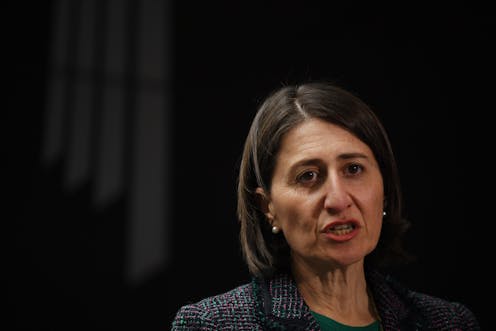Barilaro keeps Nationals in the tent; koalas stay in limbo
- Written by Michelle Grattan, Professorial Fellow, University of Canberra

Several premiers presently find themselves at war with the federal government. NSW Premier Gladys Berejiklian, by contrast, suddenly found herself locked in battle with her deputy premier, John Barilaro, and his bolshie band of Nationals.
The junior partner in the NSW coalition chose this week to pull on a stoush over a new regime the state government launched months ago to protect koalas, which have been devastated and displaced by fires and drought.
That a row over koalas could shake the Berejiklian government to its core during a pandemic is startling, at the least. The Nationals justify this by saying they’d long been told their concerns would be considered, and they hadn’t been.
They insist they’re not anti-koala — they’d like to see the population doubled, they say — but claim the new regime is too burdensome, including by extending the definition of core koala habitat and increasing the number of koala tree species.
Read more: The NSW koala wars showed one thing: the Nationals appear ill-equipped to help rural Australia
The Nationals are under pressure from farmers and, at a political level, from the Shooters, Fishers and Farmers party, which is always nipping at their heels.
Within the Nationals, pressure built with first one, then two, and several more MPs in revolt — and quickly the whole party. Efforts to get a special meeting to deal with the koala issue were unsuccessful – the premier had other things on her plate.
By Thursday, the Nationals had resolved that until the koala row was addressed they’d no longer attend joint party room or parliamentary leadership meetings and would abstain from voting on government bills. (They reserved the right to support bills and motions important to regional areas.)
“This effectively puts the entire party on the crossbench,” the party said in a statement.
Barilaro insisted the Nationals could take this stand while their ministers remained in cabinet.
This would have made them sort of “virtual” crossbenchers – a very strange notion indeed under the Westminster system.
A frustrated Berejiklian issued an ultimatum. “It is not possible to be the deputy premier or a minister of the Crown and sit on the crossbench,” she said in a statement.
She said she’d told Barilaro that he and his Nationals cabinet colleagues had until 9am Friday “to indicate to me whether they wish to remain in my Cabinet or else sit on the crossbench”.
By Friday morning, Barilaro had stepped his party back from the brink. After a meeting with Berejiklian, the two leaders said in the briefest of statements the coalition remained “in place”, as did “cabinet conventions and processes”.
Meanwhile, koalas were to be dealt with at a coming cabinet meeting. The extraordinary upheaval may be over for now, but it leaves scars, questions, uncertainty and tension.
Most obviously, the substantive issue is still unresolved. If the Nationals don’t get their way on changes to the koala regime, there could easily be another explosion. If they do, many Liberals will be angry.
The Nationals’ constituency will be behind the party’s stand. But for numerous Liberal supporters, compromise on as emotive an issue as koalas will be an electoral no-no.
This week’s events have again brought into question Barilaro’s judgement.
He was caught between the strong feelings within his party and the need to maintain the coalition. He laid himself open to criticism of firstly overreaching and then failing to carry through his threat.
This is against the background of his behaviour before the Eden-Monaro byelection, when he as good as said he would run for the seat and then said he wouldn’t.
Read more: Eden-Monaro opens wounds in Nationals, with Barilaro attack on McCormack
Even some Nationals shake their heads, while the Liberals resent what Berejiklian has to put up with.
At one stage on Thursday, Barilaro asked his parliamentary party if they thought someone else would be better to lead them. The idea was dismissed. Nevertheless, the past few days have fanned doubts about his style of leadership.
Most serious in the immediate term, the trust between Berejiklian and Barilaro has been further eroded, after taking a knock from his conduct over Eden-Monaro. The NSW coalition remains intact, but no one can miss the crack that has been repaired by superglue. It is not as robust as it once was.
And Berejiklian has less patience with her volatile partner than she used to have.
Authors: Michelle Grattan, Professorial Fellow, University of Canberra





